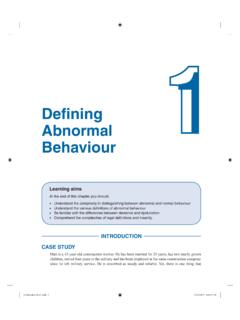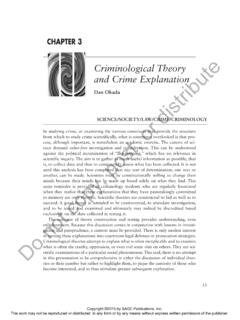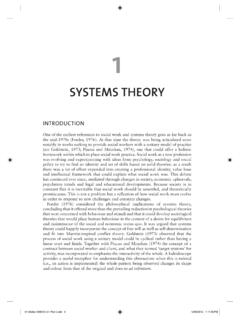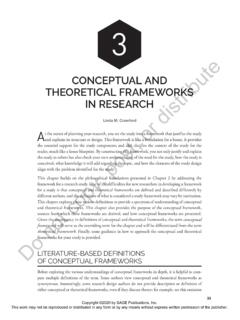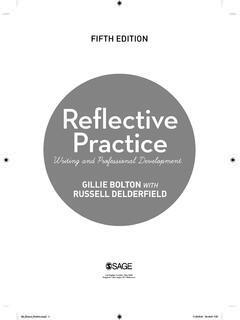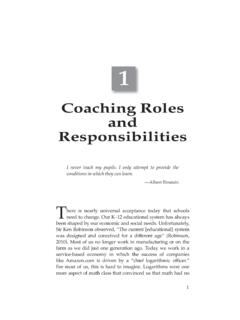Transcription of A SHORT INTRODUCTION TO COUNSELLING - SAGE …
1 A SHORT INTRODUCTION TOCOUNSELLINGS ally AldridgeA SHORT INTRODUCTION 407/11/2013 14 318/01/2014 2:32:53 PM1 WHAT IS COUNSELLING ?INTRODUCTIONTaxi driver to passenger: What do you do? Passenger: I m a counsellor. Taxi driver: A town councillor? Passenger: No. You ve heard of Relate, Marriage Guidance COUNSELLING ? Well like that but for all sorts of problems. This dialogue captures some of the difficulties COUNSELLING has in defining itself. One of the problems is that the term COUNSELLING is used in contexts other than the therapeutic: a debt counsellor gives you debt advice and help with employment and consumer law. Google counsellor and the fourth and fifth entries are for travel counsellors who will sell you a holiday.
2 Members of the public seeking COUNSELLING know the difference and are very unlikely to ask you about the thermal properties of new windows. This chapter addresses the question What is COUNSELLING ? from a num-ber of perspectives, starting with a range of definitions of COUNSELLING and the terms in common use to describe the therapies. There is a brief account of the origins and development of COUNSELLING that also traces the separation of COUNSELLING from other forms of helping such as guidance and befriend-ing in the 1990s. The chapter then looks at some of the different views of the nature and purpose of COUNSELLING within the field and considers the social and political dimensions of COUNSELLING .
3 Finally it describes the positions held on the difference between COUNSELLING and psychotherapy. Throughout, this book is about working with individuals rather than couples or has been a feature of everyday life since the second half of the twentieth century and yet even when experts are employed to carry out the task, they find that the COUNSELLING sector is difficult to define (ENTO 2008: 29). Despite, or perhaps because of this, it is estimated that there are 100,000 people delivering therapy in the United Kingdom (Mental Health Foundation, Mind et al. 2006), the majority describing what they do as 118/01/2014 2:34:01 PMA SHORT INTRODUCTION TO COUNSELLING2 DEFINITIONS OF COUNSELLINGT here are several definitions of COUNSELLING in circulation.
4 Some are exclusive to COUNSELLING , some are inclusive of all the talking therapies and some seek to differentiate between the various talking therapies. Most of the definitions of COUNSELLING below are written by profes-sional organisations and reflect the views of their members; or by organisations and government agencies and reflect the services on offer. The first two British Association for COUNSELLING /British Association for COUNSELLING and Psychotherapy (BAC/BACP) defini-tions from 1978 and 2013 illustrate the development of COUNSELLING during that Definition by the Standing Conference for the Advancement of COUNSELLING /British Association for COUNSELLING COUNSELLING takes place when one person accepts responsibility for help-ing another to decide upon a course of action or to understand or change patterns of behaviour which distress, disturb or affect his social behaviour.
5 The definition continues to describe when COUNSELLING takes place and states that COUNSELLING may be incidental to the other functions of the professional for example a teacher and pupil. It may be educational and vocational guidance, provided by a specialist service for particular prob-lems or within voluntary agencies (Standing Conference for the Advancement of COUNSELLING 1978).2013 BACP Definition OneCounselling and psychotherapy are umbrella terms that cover a range of talking therapies. They are delivered by trained practitioners who work with people over a SHORT or long term to help them bring about effective change or enhance their is time set aside by you and the therapist to look at what has brought you to therapy.
6 This might include talking about life events (past and present), feelings, emotions, relationships, ways of thinking and patterns of behaviour. The therapist will do their best to help you to look at your issues, and to identify the right course of action for you, either to help you resolve your difficulties or help you find ways of coping. Talking about these things may take time, and will not necessarily all be included in one session. The number of sessions offered may be limited, and so it is best to ask about this in advance, for example, brief therapy or SHORT term therapy might provide a maximum of 6, 8, 10 or 12 sessions.
7 ( ) 218/01/2014 2:34:01 PMWHAT IS COUNSELLING ?32013 BACP Definition TwoCounselling takes place when a counsellor sees a client in a private and confidential setting to explore a difficulty the client is having, distress they may be experiencing or perhaps their dissatisfaction with life, or loss of a sense of direction and purpose. It is always at the request of the client as no one can properly be sent for listening attentively and patiently the counsellor can begin to perceive the difficulties from the client s point of view and can help them to see things more clearly, possibly from a different perspective.
8 COUNSELLING is a way of enabling choice or change or of reducing confusion. It does not involve giv-ing advice or directing a client to take a particular course of action. Counsellors do not judge or exploit their clients in any the COUNSELLING sessions the client can explore various aspects of their life and feelings, talking about them freely and openly in a way that is rarely possible with friends or family. Bottled up feelings such as anger, anxiety, grief and embarrassment can become very intense and COUNSELLING offers an opportunity to explore them, with the possibility of making them easier to understand.
9 The counsellor will encourage the expression of feelings and as a result of their training will be able to accept and reflect the client s prob-lems without becoming burdened by and respect for the client are essentials for a counsellor and, as the relationship develops, so too does trust between the counsellor and client, enabling the client to look at many aspects of their life, their relationships and themselves which they may not have considered or been able to face before. The counsellor may help the client to examine in detail the behaviour or situa-tions which are proving troublesome and to find an area where it would be possible to initiate some change as a start.
10 The counsellor may help the client to look at the options open to them and help them to decide the best for them. ( )MIND (the mental health charity) DefinitionCounselling provides a regular time and space for people to talk about their troubles and explore difficult feelings, in an environment that is dependable, free from intrusion and confidential. A counsellor should respect your view-point, while helping you to deal with specific problems, cope with crises, improve your relationships, or develop better ways of living. Despite the name, counsellors don t usually offer advice. Instead, they help you to gain insight into your feelings and behaviour and to change your behaviour, if necessary.
